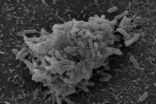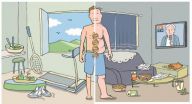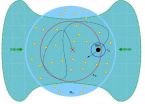(Press-News.org) In the aftermath of the global financial crisis and the ensuing economic and political disruptions, inequality has re-emerged as a central focus of public debate. The drivers of rising inequality of income and wealth and the various scientific models for counteractive measures will be among the central topics debated among 17 Nobel Laureates in Economic Sciences and approximately 450 aspiring young economists from more than 80 countries in Lindau, Germany, next week. The 5th Lindau Meeting on Economic Sciences will bring them together for a unique dialogue across generations, cultures and scientific backgrounds. The meeting will open on 20 August with a keynote address by German Chancellor Angela Merkel, and will also feature "a panoramic view on the situation and prospects in Latin America" by Mario Vargas Llosa, the 2010 Nobel Laureate in Literature.
From 20 to 23 August, the participating laureates and the young economists will have plenty of opportunity for an intensive exchange of ideas. The numerous lectures, discussions, master classes and panel discussions of the programme will address central fields of the discipline, ranging from econometrics, game theory, and neo-classical growth theory to mechanism design and systemic risk measurement. The overarching question "How useful is economics – how is economics useful?" will also be subject of the meeting's closing panel debate on Mainau Island on Saturday, 23 August. As a special guest of honour, Queen Silvia of Sweden will attend the concluding events that day.
Among the sessions addressing the challenge of high and rising inequality will be plenary lectures by Joseph Stiglitz, Eric Maskin and James Mirrlees.
Joseph Stiglitz: "Inequality, wealth and growth: why capitalism is failing"
Recent data note large increases in both wealth and the wealth/income ratio. But there has not been the associated decline in interest rates or
increases in wages that might have been expected. Indeed, in some countries, such as the United States, there has been wage stagnation.
If "wealth" is taken to be capital, this leads to a seeming paradox, a strong contradiction to the neoclassical model, because high levels of inequality are considered to be a natural aspect of capitalism – with the short period of the few decades before 1980 representing an exception.
In his lecture, Joseph Stiglitz will resolve the seeming paradox. He will describe the centrifugal and centripetal forces that lead to increased and diminished inequality. And he will show how the balance between these forces has been disturbed since 1980 to lead to a higher 'equilibrium' level of inequality.
Professor Stiglitz will explain that today's higher level of inequality is not just the result of market forces, but of policies and politics, some of which have impeded the way that a well-functioning competitive market would behave. The final piece of his analysis will link growing inequality to the financial system and the process of credit creation.
Eric Maskin: "Why haven't global markets reduced inequality in developing economies?"
The theory of comparative advantage predicts that globalisation should cause income inequality in emerging economies to fall. But this has not happened in the current era of increasing international trade (although the prediction held up well for previous globalisations).
In his lecture, Eric Maskin will sketch an alternative theory – developed in collaboration with his Harvard colleague Michael Kremer – that seems to fit recent history well. The model conceives of globalisation as an increase in international production. Computers are a good example: they may be designed in the United States, programmed in Europe and assembled in China.
Professor Maskin will show that when the barriers to international production come down, moderately skilled workers in emerging economies get new employment opportunities and unskilled workers don't. It is this disparity, he will argue, that accounts for rising inequality in many developing countries.
Sir James Mirrlees: "Some Interesting Taxes and Subsidies"
There are situations where marginal tax rates of 100% or nearly 100% may be justified, according to analysis by Sir James Mirrlees. In his lecture, he will sketch three models: one, which makes unusual assumptions about preferences for labour, can justify income subsidies of low incomes with implicit marginal tax rates of 100%.
The second, assuming high substitutability between consumption and work, might justify marginal tax rates approaching 100% on the highest incomes. The last, with competition between skilled workers (such as sportsmen or inventors) for market share, might justify marginal rates of 100% on high incomes of a particular type.
Professor Mirrlees will conclude that the assumptions under which these conclusions follow may not hold in actual economies – but they might sometimes. In any case, extreme results, and the reasons for them, can help us understand how incentives work and their implications for taxation.
INFORMATION:
The Lindau Meetings
From their beginning in 1951 as a European initiative of post-war reconciliation, the Lindau Nobel Laureate Meetings have evolved into a unique forum for unconstrained scientific exchange among physiologists, physicists, and chemists. The Lindau Meetings are designed to educate, inspire, and connect. Every year esteemed Nobel laureates and aspiring young scientists from all over the world come together at Lindau to engage in an open dialogue across generations and cultures. Regular meetings on economic sciences were enacted in 2004. Here some of the world's most dedicated young economists have the opportunity to pose the questions and discuss the issues they are most concerned about or interested in.
Inequality -- a key issue of economic research
Nobel laureates and aspiring young economists from all over the world to discuss models and concepts in Lindau later this month
2014-08-11
ELSE PRESS RELEASES FROM THIS DATE:
Clues emerge to genetic architecture of cognitive abilities in children
2014-08-11
How genes affect intelligence is complicated. Multiple genes, many yet unknown, are thought to interact among themselves and with environmental factors to influence the diverse abilities involved in intelligence.
A large new genetic study in thousands of children and adolescents offers early glimpses of the overall patterns and connections among cognitive abilities such as language reasoning, reading skill and types of memory. The findings may lead to new tools in understanding human cognitive development and neuropsychiatric disorders.
"This research is one of the ...
More intensive interventions needed to combat severe obesity in teens
2014-08-11
New Rochelle, NY, August 11, 2014 -- Nearly 6% of all children and teens in the U.S. are severely obese, and the prevalence of severe obesity is increasing faster than that of moderate obesity or overweight. This is an alarming trend as about 90% of these youths will grow up to be obese adults. The serious health problems associated with severe obesity and the poor long-term prognosis and quality of life projected for these children and teens demand more serious consideration of safe and effective treatment options that go beyond diet and lifestyle modifications, as proposed ...
Pairing old technologies with new for next-generation electronic devices
2014-08-11
UCL scientists have discovered a new method to efficiently generate and control currents based on the magnetic nature of electrons in semi-conducting materials, offering a radical way to develop a new generation of electronic devices.
One promising approach to developing new technologies is to exploit the electron's tiny magnetic moment, or 'spin'. Electrons have two properties – charge and spin – and although current technologies use charge, it is thought that spin-based technologies have the potential to outperform the 'charge'-based technology of semiconductors for ...
Sugary bugs subvert antibodies
2014-08-11
A lung-damaging bacterium turns the body's antibody response in its favor, according to a study published in The Journal of Experimental Medicine.
Pathogenic bacteria are normally destroyed by antibodies, immune proteins that coat the outer surface of the bug, laying a foundation for the deposition of pore-forming "complement" proteins that poke lethal holes in the bacterial membrane. But despite having plenty of antibodies and complement proteins in their bloodstream, some people can't fight off infections with the respiratory bacterium Pseudomonas aeruginosa. And chronic ...
Tackling liver injury
2014-08-11
A new drug spurs liver regeneration after surgery, according to a paper published in The Journal of Experimental Medicine.
Liver cancer often results in a loss of blood flow and thus oxygen and nutrients to the liver tissue, resulting in deteriorating liver function. Although the diseased part of the liver can often be surgically removed, the sudden restoration of blood flow to the remaining liver tissue can trigger inflammation—a process known as ischemia reperfusion injury (IRI). IRI results in part from the deposition of immune proteins called complement on the surface ...
'Seeing' through virtual touch is believing
2014-08-11
Visual impairment comes in many forms, and it's on the rise in America.
A University of Cincinnati experiment aimed at this diverse and growing population could spark development of advanced tools to help all the aging baby boomers, injured veterans, diabetics and white-cane-wielding pedestrians navigate the blurred edges of everyday life.
These tools could be based on a device called the Enactive Torch, which looks like a combination between a TV remote and Captain Kirk's weapon of choice. But it can do much greater things than change channels or stun aliens.
Luis ...
Aberrant mTOR signaling impairs whole body physiology
2014-08-11
The protein mTOR is a central controller of growth and metabolism. Deregulation of mTOR signaling increases the risk of developing metabolic diseases such as diabetes, obesity and cancer. In the current issue of the journal Proceedings of the National Academy of Sciences, researchers from the Biozentrum of the University of Basel describe how aberrant mTOR signaling in the liver not only affects hepatic metabolism but also whole body physiology.
The protein mTOR regulates cell growth and metabolism and thus plays a key role in the development of human disorders. In the ...
Not only in DNA's hands
2014-08-11
Blood stem cells have the potential to turn into any type of blood cell, whether it be the oxygen-carrying red blood cells, or the many types of white blood cells of the immune system that help fight infection. How exactly is the fate of these stem cells regulated? Preliminary findings from research conducted by scientists from the Weizmann Institute and the Hebrew University are starting to reshape the conventional understanding of the way blood stem cell fate decisions are controlled thanks to a new technique for epigenetic analysis they have developed. Understanding ...
All-you-can-eat at the end of the universe
2014-08-11
At the ends of the Universe there are black holes with masses equaling billions of our sun. These giant bodies – quasars – feed on interstellar gas, swallowing large quantities of it non-stop. Thus they reveal their existence: The light that is emitted by the gas as it is sucked in and crushed by the black hole's gravity travels for eons across the Universe until it reaches our telescopes. Looking at the edges of the Universe is therefore looking into the past. These far-off, ancient quasars appear to us in their "baby photos" taken less than a billion years after the Big ...
Nanocubes get in a twist
2014-08-11
Nanocubes are anything but child's play. Weizmann Institute scientists have used them to create surprisingly yarn-like strands: They showed that given the right conditions, cube-shaped nanoparticles are able to align into winding helical structures. Their results, which reveal how nanomaterials can self-assemble into unexpectedly beautiful and complex structures, were recently published in Science.
Dr. Rafal Klajn and postdoctoral fellow Dr. Gurvinder Singh of the Institute's Organic Chemistry Department used nanocubes of an iron oxide material called magnetite. As ...
LAST 30 PRESS RELEASES:
New ‘scimitar-crested’ Spinosaurus species discovered in the central Sahara
“Cyborg” pancreatic organoids can monitor the maturation of islet cells
Technique to extract concepts from AI models can help steer and monitor model outputs
Study clarifies the cancer genome in domestic cats
Crested Spinosaurus fossil was aquatic, but lived 1,000 kilometers from the Tethys Sea
MULTI-evolve: Rapid evolution of complex multi-mutant proteins
A new method to steer AI output uncovers vulnerabilities and potential improvements
Why some objects in space look like snowmen
Flickering glacial climate may have shaped early human evolution
First AHA/ACC acute pulmonary embolism guideline: prompt diagnosis and treatment are key
Could “cyborg” transplants replace pancreatic tissue damaged by diabetes?
Hearing a molecule’s solo performance
Justice after trauma? Race, red tape keep sexual assault victims from compensation
Columbia researchers awarded ARPA-H funding to speed diagnosis of lymphatic disorders
James R. Downing, MD, to step down as president and CEO of St. Jude Children’s Research Hospital in late 2026
A remote-controlled CAR-T for safer immunotherapy
UT College of Veterinary Medicine dean elected Fellow of the American Academy of Microbiology
AERA selects 34 exemplary scholars as 2026 Fellows
Similar kinases play distinct roles in the brain
New research takes first step toward advance warnings of space weather
Scientists unlock a massive new ‘color palette’ for biomedical research by synthesizing non-natural amino acids
Brain cells drive endurance gains after exercise
Same-day hospital discharge is safe in selected patients after TAVI
Why do people living at high altitudes have better glucose control? The answer was in plain sight
Red blood cells soak up sugar at high altitude, protecting against diabetes
A new electrolyte points to stronger, safer batteries
Environment: Atmospheric pollution directly linked to rocket re-entry
Targeted radiation therapy improves quality of life outcomes for patients with multiple brain metastases
Cardiovascular events in women with prior cervical high-grade squamous intraepithelial lesion
Transplantation and employment earnings in kidney transplant recipients
[Press-News.org] Inequality -- a key issue of economic researchNobel laureates and aspiring young economists from all over the world to discuss models and concepts in Lindau later this month







